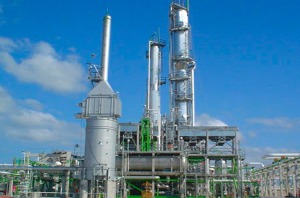Mexico City, Mexico - Mexico plans to invest $3.13 billion pesos (some $242 million USD) in a project that will use state-of-the-art technology to assess the nation's prospective non-conventional oil and gas resources, the Energy Secretariat said.
The Mexican Petroleum Institute will carry out the project with the active participation of state oil monopoly Petroleos Mexicanos, or Pemex, at the Galaxia block in the Burgos basin and the Limonaria block in the Tampico-Misantla basin, both located in northeastern Mexico, the secretariat said in a statement.
The project will enable Mexico, one of the world's largest crude producers, to "organize areas with potential resources into a hierarchy and determine if these are oil or gas formations."
It also will involve "the conceptual design of well drilling and termination" with a view to causing the least possible environmental and social impact and achieving the highest profitability, as well as the training of specialized human resources in the field.
"This amounts to an unprecedented push for research in this sector at the national level because of the size of the technological and investment impact the approved amount entails," the secretariat said.
The project, it said, will lay the foundation for the future sustainable development of shale gas and shale oil, non-conventional hydrocarbons that are trapped in low-permeability rock and require special technology to extract.
It also will involve "a very significant economic outlay" that will lead to the creation of jobs and capabilities at the national level, it said.
The Paris-based International Energy Agency said late last year that Mexico has a bright energy future, especially in natural gas. "Mexico is sitting on very large natural gas fields that could allow it to end gas imports and could give it energy independence," IEA Executive Director Maria van der Hoeven said in November 2011.
Mexico, according to estimates by international organizations, has the world's fourth-largest shale gas reserves, with some 680 trillion cubic feet of the fuel.
Shale gas comes from unconventional geological formations and requires different extraction methods, including the use of pressurized fluid to create a facture in the rock layer, a process known as hydraulic fracturing, or "fracking."
Gas production will be developed under existing laws and will be undertaken using the incentive-based contracts created by the 2008 energy industry reforms, Energy Secretary Jordy Herrera said last year.
The incentive-based contracts will allow companies to invest, produce and earn bigger profits from more productive gas fields, Herrera said.
Mexico is searching for new resources at a time when oil production has fallen by a quarter from its peak of 3.4 million barrels a day in 2004.
Though production has recently stabilized and the country achieved a reserve-replacement ratio of 100 percent this year, Mexico's output has suffered from the natural decline of the once-super giant Cantarell offshore field and a lack of sufficient investment.
In addition to assessing its non-conventional reserves, Pemex also is looking to boost energy production by focusing on exploring deep-water areas in the Gulf of Mexico, where significant oil finds have been made in recent months.


